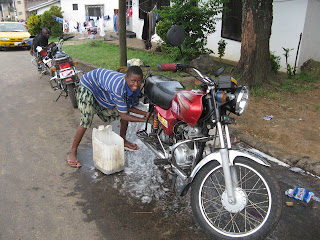Lovely to be back from R&R. I spent 2 weeks in the Europe eating and drinking all the things. I think I visited every H&M on the continent to replace my wardrobe that has slowly eroded into nothing over the last seven months. Have to be well dressed to face Lakes State's recent promotion to second most insecure area!
When I left RBK there were altercations with the police and wildlife services over cut in pay. Without going into details, the event was a lot worse than what the media makes it out to be (*cough* there is absolutely no suppression of the media here). I've returned to something a bit worse.
Currently it is the season for traditional dancing and gatherings. Which on the surface is really cool. There are a lot of cattle keepers in town, there are a lot of flags and singing and dancing and running and drumming etc etc. But there are also a lot of guns. There have been shootings everyday at schools, on the street, late at night. There have also been a number of break ins to businesses, kidnappings and threats to business owners, and systemic attacks against East Africans and South Sudanese that are not from Lakes (Lakes is also just getting over a malaria epidemic and MASSIVE floods that displaced an estimated 23,000 people in Awerial County in Lakes).
Next week salaries are released again. There is still no money to pay the armed services their full salaries. We've also been informed that the SPLA may not get their full salaries either - which may make them a bit peeved. They were the only government body to be paid, in full (or at all) since the beginning of austerity measures. This place will be one to watch.
FORTUNATELY, the Sudanese and South Sudanese executives have agreed on enough to start the oil flowing again and solve some of the citizenship issues. This will still take 6 months for any revenues, but they will both be eligible for loans. There's also a rumour that the Qataries threw a few hundred million dollars into the pot to help float this place (and promptly decrease the already artificially low exchange rate... sigh...). So I hope everything will calm down a bit and everyone can get paid. What the deal did not do is tough the disputed territories on the borded of the North and South. Nor did it discuss how the North is air dropping arms into Jonglei State, or how the South is turning a blind eye to militias operating openly out of Unity State. But foreign enemies are a nice distraction from the internal issues that both countries face. So I guess they may not want to clean these up too quickly?
Long story short. South Sudan. One to watch?

